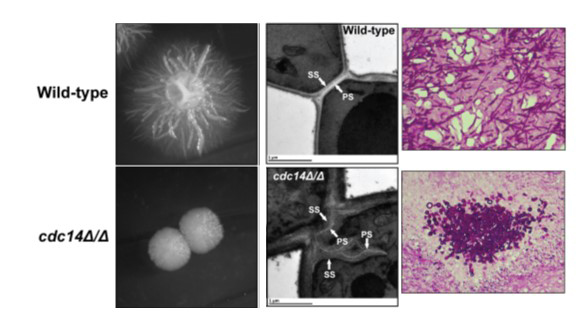current research projects
The intersection of cell cycle regulation and fungal pathogenesis. The Hall lab has a long-standing interest in molecular mechanisms regulating cell division. One place that cell division overlaps with fungal pathogenesis is the fungal cell wall. Fungal cell walls are structurally unique among eukaryotes, making them, and the enzymes that synthesize and regulate them, attractive targets for antifungal drugs. The echinocandin class of antifungal drugs (e.g. micafungin and caspofungin) act by inhibiting a key enzyme in fungal cell wall synthesis. Synthesis of the fungal cell wall must be tightly coordinated with cell growth during the cell division cycle. Our lab is now focusing heavily on regulatory enzymes like phosphatases and kinases that play important roles in regulating fungal-specific aspects of the cell division cycle.
Proteomic and functional genomic approaches to study virulence factors and support early drug discovery. The majority of our current work is conducted in the pathogenic yeast Candida albicans. In addition to using biochemistry, cell biology, molecular biology, and genetic methods, we also employ mass spectrometry-based proteomic tools in a variety of ways. For example, we are currently developing methods to combine inducible protein degradation with proteomics to characterize functions and substrates of fungal phosphatases and kinases related to pathogenesis. We are also coupling inducible protein degradation with in vivo pathogenesis models as a tool for identifying new antifungal drug targets. Cdc14 mutations cause defective hyphal development and septum formation in Candida albicans
Cdc14 mutations cause defective hyphal development and septum formation in Candida albicans